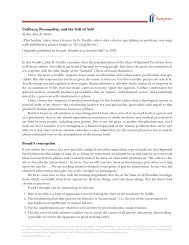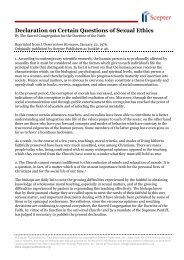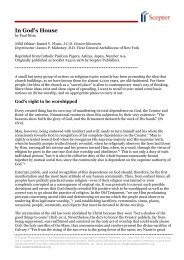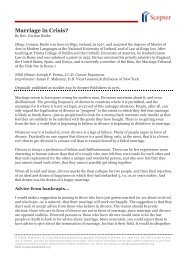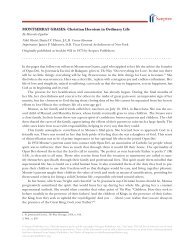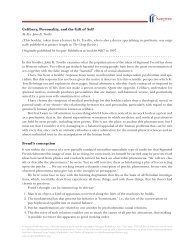by Joseph Soria - Scepter Publishers
by Joseph Soria - Scepter Publishers
by Joseph Soria - Scepter Publishers
You also want an ePaper? Increase the reach of your titles
YUMPU automatically turns print PDFs into web optimized ePapers that Google loves.
Among these spiritual values we find those elements of religious life which are necessary <strong>by</strong> the will of<br />
God, such as the sacraments and other means that are necessary to maintain an intimate and loving relationship<br />
with our Lord, such as prayer, doctrinal instruction, and so forth. At bottom what is essential is living<br />
that order which is the basis of every other order, that which subordinates the creature to its Creator.<br />
After this come the obligations which arise from our status and position in our family and society. We<br />
may be single, married, widow or widower; priest or layman; son or daughter, father or mother; husband<br />
or wife; employee or boss; miner, judge, student, office worker or a manual laborer; retired, and so on. All<br />
such personal circumstances constitute the basis of what we call duties of our state, our ordinary, natural<br />
duties and obligations.<br />
Finally, there are other duties, also ordinary, which might seem at times to be luxuries but which cannot<br />
be ignored. These include rest, diversion, culture, sport, and so on. As we shall see, all of these things should<br />
contribute to a balanced plan of life, but none should take priority in our lives.<br />
Order in our external behavior<br />
Customs and manners are not universal. Every age and culture has its own conventions for conversation and<br />
writing, protocols and standards of etiquette, and aesthetic preferences – and these things vary from time<br />
to time and place to place. Often changes arise as reactions to what previously prevailed. For example, in<br />
response to an earlier generation’s excessive valuing of formality, a new generation may embrace simplicity<br />
to such an extent that it is no longer a virtue.<br />
The problem is not the evolution of customs and conventions, but the loss of certain values that may be<br />
effected <strong>by</strong> such evolution. One gains very little if the reaction against one sort of formalism constitutes an<br />
even greater formalism of another sort. It is even worse if this change eliminates positive elements of the<br />
past and does not replace them with new elements of equal value. In this way, a lack of concern for the care<br />
of material things is not necessarily a manifestation of a healthy detachment or freedom of spirit, for it may<br />
also be a manifestation of carelessness, laziness, or childish and immature rebellion. Dirty shoes or tattered<br />
clothes, missing buttons, purposely made holes, and so on, are all examples of this kind of thing.<br />
Of course the dirtiness of a suit of work clothes need not be judged <strong>by</strong> the same criteria that a business<br />
suit or a dress for a social event would be. In every case, however, there are limits that should not be<br />
exceeded, out of both a sense of order and respect for those around us. The proverbial absentminded<br />
professor is a good example of the kind of disorder to which I am referring. He represents a person who<br />
has built his whole life around a center with a relative value—scientific knowledge—who tends to forget or<br />
ignore (a disorder), all the rest. He skips meals, works all night without sleeping, and neglects the obligations<br />
of family and friendship. He dresses in a disheveled manner with clothes that don’t match. In his office<br />
working papers are mixed up with unpaid bills, and whatever order there may be is one of simple sedimentation,<br />
like geological strata. On the same shelf there may sit for weeks the remains of a cup of coffee, a halfeaten<br />
sandwich, and the pages of an unfinished essay.<br />
Still, one must also avoid the other extreme of giving primary importance to external appearances, to<br />
how one is dressed or groomed, to what others think of us, or our hairstyle, or our way of moving our left<br />
hand while speaking. Here too there is a grave disorder; mere appearances and frivolity should not be the<br />
center of human life.<br />
Order in material things<br />
Order should also be present in our material effects. How often do we hear—at home, or at the office, the<br />
clinic, the workshop, or the library—someone complain that he cannot find what he is looking for because<br />
© <strong>Scepter</strong> <strong>Publishers</strong>, Inc. This information protected <strong>by</strong> copyright of <strong>Scepter</strong> <strong>Publishers</strong>, Inc., New York, NY USA. It is for the free use of readers,<br />
and may be redistributed without permission. None of this information can be sold, either in electronic or print form, unless permission<br />
has been obtained from <strong>Scepter</strong> <strong>Publishers</strong>, Inc. Direct all inquiries to info@scepterpublishers.org.<br />
www.scepterpublishers.org



